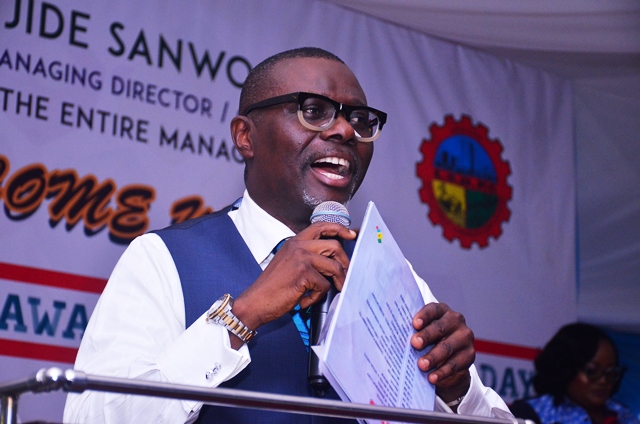A former Special Adviser to Mr. Femi Pedro as Deputy Governor of Lagos State as well as Special Adviser to former Governor Bola Tinubu before becoming a full Commissioner for Establishment in 2007, Mr. Jide Sanwoolu, has joined the governorship race on the platform of the ruling All Progressives Party (APC)
Below is the details of Jide Sanwoolu:
SANWO-OLU Babajide Olusola is widely regarded as a public sector expert in
human resources and policy formation a power sector consultant per excellence,
an astute banker, a compelling public speaker and an inspirational leader. Apart
from a robust public sector service experience which spanned over eight years during
which he was Honourable Commissioner for Commerce and Industry, Honourable
Commissioner for Budget and Planning and Honourable Commissioner for
Establishments and Training, Lagos State, at different times, the very dynamic Babajide
also has an enviable background in the private sector and close to ten years of exemplary
banking experience during which he contributed immensely to the growth and
development of Lead Bank Plc, UBA, and First Atlantic Bank (now First City Monument
Bank) in various critical capacities.
He has distinguished himself as a boardroom guru and has since become a widely
recognised force in both the private and public sector, serving as Board member,
Department for International Development, DFID/DEEPEN Fund; Member of the Board
Audit Committee of Caverton Offshore Services Group, PLC and as Director, Light Level
Nigeria Limited, the foremost digital signage company in Nigeria.
He also serves as Chairman for a number of thriving organisations, including Baywatch
Group Limited – a multifaceted company with interests in construction, property
development and human capital development – where he has served as Chairman/CEO
since July 2011. First Class Group Limited, a cooling, power and maintenance solutions
provider recognised widely for providing critical support for all major
telecommunications company in the area of specialised cooling. Powercap Consulting, a
leading power consulting boutique with vast experience in power privatisation exercise.
Beryl Shelter, an estate management rm that specialises in research, marketing
intelligence and sales of high end properties. Wow! Interiors, an interior design services
and luxury furniture retail store for high end corporate and residential clients.
As Treasurer at Lead Bank Plc between 1994 and 1997, Babajide managed the liquid asset
of the bank and general funding requirements on a daily basis. At United Bank for Africa,
UBA, he was Senior Manager (Head, Foreign Money Market) managing the bank’s
liquidity position vis a vis protability. He was also responsible for articulating and implementing the bank’s strategy in Investment Banking activities and Issuing House and
Portfolio Management.
Subsequently, Babajide rose to the position of Deputy General Manager (Divisional Head)
at First Inland Bank Plc, where he was Corporate Financial Advisor to several
multinational companies. He also supervised the Bureau of Public Enterprises (BPE)
privatisation projects including the concession of the National Arts Theatre, and the Lagos
Trade International Fair Complex, the acquisition of Ikoyi Hotels Limited as well as the
Federal Government Debt Conversion Programme.
His meteoric rise within the system of the Lagos State government is particularly
exemplary; testament to his unique leadership abilities and exceptional contributions to
good governance within the State.
Babajide’s appointment, in 2003, as Special Adviser on Corporate Matters to the Deputy
Governor, took the government circles by storm. However, the consequent recognition
which he quickly gained, coupled with his outstanding performance earned him the same
job title and description again, this time, with the Executive Governor himself after only
one year.
Working directly with the Governor, he was responsible for creating an environment that
fosters private sector participation and was instrumental to the present situation where
members of the private sector see themselves as stakeholders in the governance of the
State. He also formulated policies and programmes to improve the relationship between
government and Organized Private Sector (OPS).
In conjunction with other agencies of government, Babajide was able to initiate, identify,
promote and structure new projects and programmes in areas like the Environment,
Transportation, Commerce, Finance and Infrastructure while also preparing and tracking
the Internally Generated Revenue from various agencies including the BIR and analysing
same for the Governor.
He was also responsible for the preparation and publication of the Lagos State Economic
Empowerment and Development Strategy (LASEEDS).
While still serving in this capacity, Babajide was appointed acting Honourable
Commissioner, Economic Planning and Budget, owing to his hard work and attention to
details. He became responsible for the preparation of the annual budget for the State
Government and the processing of the annual budget of the different parastatals; a duty
he performed judiciously.
It was no surprise therefore, when in 2007, he became the Honourable Commissioner for
Commerce and Industry until the end of that administration. At the start of the next
administration, Babajide was again appointed Honourable Commissioner, this time, for
Establishments, Training and Pensions.
Babajide’s stirring team playing ability was evident in the critical roles he played within
the government in partnership with several units and ofces. For instance, in conjunction
with the Head of Service, he was responsible for timely review of salaries, wages and
allowances while he also articulated the state government’s Conditions of Service. As a
security awareness expert, he helped set up the Lagos State Security Trust Fund and
subsequently became a board member for over four years.
Although he holds an MBA and a B.Sc in Surveying from the University of Lagos, his
quest for knowledge has taken him to several courses and trainings in several continents
of the world, including Europe, USA, Asia and Africa. He is an alumnus of the prestigious
Kennedy School of Government, USA; the London Business School as well as the Lagos
Business School, LBS.
Babajide is also an associate member of The Chartered Institute of Personnel
Management (CIPM) and fellow of The Nigeria Institute of Training and Development
(NITAD).
A man of admirable social skills, he also nds some time for leisure and social activities
amidst his demanding itinerary, as he is a member of the Ikoyi Club, the Island Club, as
well as the Clear Essence Health Club.
Babajide’s laudable achievements have not gone unnoticed. He has received several
awards in recognition of his tremendous contributions to society. They include the
Symbol of Excellence award from the Civic Enlightenment Association of Nigeria, a Gold
mentor award from the National Association of Nigeria Nurses & Midwives (NANNM), a
Platinum award from the Lagos State Public Service Club and the 2009 Best in Human
Capital Development award from the Industrial Training Fund (ITF). He has also received
several merit awards from the Association of National Accountants of Nigeria, Chartered
Institute of Personnel Management in Nigeria (CIPMN) amongst others.
He is happily married to Dr Mrs Ibijoke Sanwo-Olu and they are blessed with children.

 News6 years ago
News6 years ago
 Featured6 years ago
Featured6 years ago
 Boss Picks6 years ago
Boss Picks6 years ago
 Headline6 years ago
Headline6 years ago
 Headline6 years ago
Headline6 years ago
 Headline5 years ago
Headline5 years ago
 Headline6 years ago
Headline6 years ago
 Headline6 years ago
Headline6 years ago














